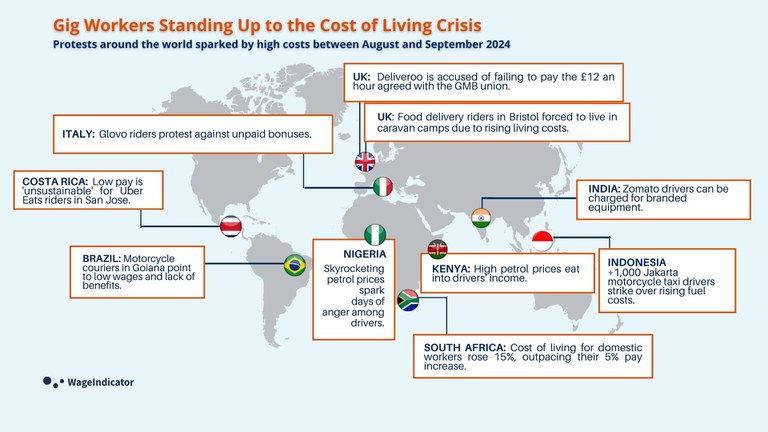Algorithm-Driven Low Pay and High Costs Remain Major Challenges for Platform Workers Globally
Algorithmically driven low pay and high costs are still the most common reasons for difficulties for platform workers around the world, according to the WageIndicator database.
As evidenced by research surrounding the Living Tariff tool, gig workers and freelancers or self-employed workers face significant financial burdens, including transportation expenses, equipment costs, and unpaid tasks such as waiting time, training, and administrative duties. Additionally, the impact of inflation and recession must be considered.
Some of the major worker actions identified in the WageIndicator database between August and September are related to issues regarding these rising costs and underpaid or unpaid labour, as well as the effects of inflation that are affecting many countries.
The map above shows this at a glance.
Looking at the protests closer
The Australian Transport Workers' Union is advocating for a wage safety net to help drivers cover expenses, earn a fair wage, and receive company-funded superannuation benefits. Platforms have expressed concerns that implementing minimum standards for gig delivery drivers could reduce flexibility and raise costs, potentially leading to higher prices for customers.
In Latin America, about 100 drivers spoke out in San Jose, the capital of Costa Rica, saying low pay is 'unsustainable'. Meanwhile, in Goiana, Brazil, motorcycle couriers and delivery app workers held a demonstration to demand better pay, highlighting issues such as low wages and inadequate benefits.
In a post that went viral, the Telangana Gig and Platform Workers Union of India raised the case of Zomato drivers being charged for branded equipment such as bags, raincoats and T-shirts.
Kenyan drivers in Nairobi used apps such as Zello to coordinate higher fares and displayed guides in their vehicles to inform passengers of acceptable fares. This is the second strike since the ride-hailing companies raised basic fares by 10% in August.
App-based motorcycle taxi drivers in Jakarta, Indonesia, are also struggling to cover fuel costs and daily expenses, leading thousands to go on strike. Platforms such as GoTo and Grab are not legally required to set minimum wages or pay social security, leaving many riders and drivers (known as "partners") without a decent income. The Transportation Ministry stated that it does not regulate fares and encouraged the platforms to consider drivers' concerns.
In the same days, Italian Glovo riders in Carini, Sicily, protested unpaid bonuses, while over 30,000 drivers nationwide have faced lower wages and harsh algorithms since COVID. Glovo couriers in Rieti also began a strike on September 8 to protest long-standing issues with their rights and working conditions. Glovo, which gained popularity in Rieti during the pandemic, relies on many foreign riders who deliver essential goods. They have voiced concerns about inadequate compensation, lack of support, and unfavorable working conditions.
Skyrocketing petrol prices (+40% in two months) spark cost-of-living protests and days of anger among Nigerian transport workers. Headline inflation accelerates to 34.19% in June 2024, with a first fuel price hike in May 2023. Nigerian drivers are expected to be among the hardest hit as maintenance costs also rise, and if fare increases are passed on to customers, demand for transport services - still considered a luxury by many Nigerians - could fall.
Transport and delivery workers are not the only ones affected: the annual SweepSouth report found that the cost of living for South African domestic workers rose by 15% last year, far outpacing their 5% pay rise.
The Guardian reports that food delivery riders in Bristol, England, are being forced to live in caravan camps due to rising living costs.
In the UK, Rodeo, an app that tracks gig economy payments, also found that most of the food orders completed in the last four months were paid less than the £12 per hour rate agreed with the GMB union earlier this year. According to the workers, the algorithm does not properly take into account waiting times, traffic and people who take longer than usual to answer the door.
The cost of living crisis worsens job insecurity in the gig economy, where unpredictable earnings and lack of a safety net leave many reliant on this unstable income source.

